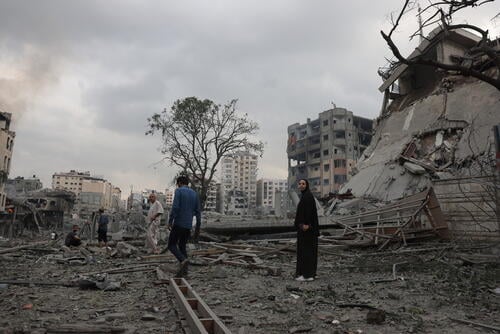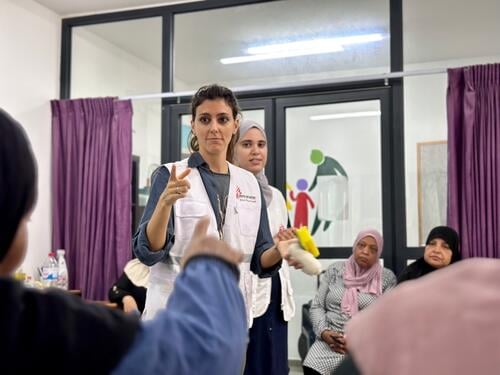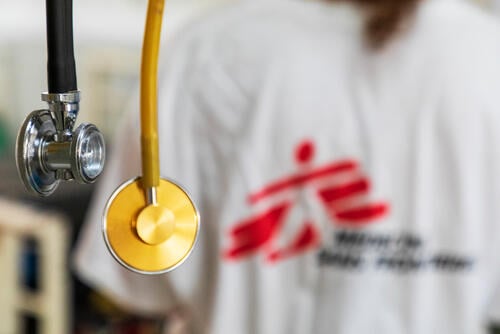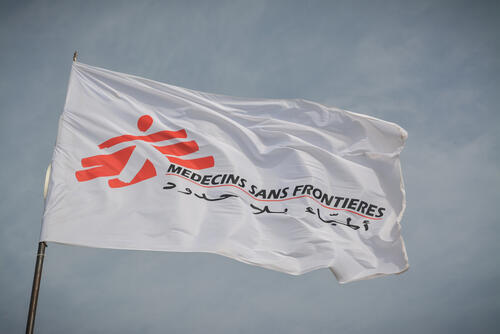Delivering lifesaving supplies into Gaza is nearly impossible amidst Israeli authorities' blockades, delays, and restrictions on humanitarian aid and essential medical supplies, explains Mari Carmen Viñoles, head of emergency programmes at Médecins Sans Frontières (MSF).
An oxygen concentrator is a medical device that filters out the nitrogen in air, delivering purified oxygen to patients. For malnourished children with severe anaemia, injured people with severe blood loss and newborns with breathing difficulties, this device can be the difference between life and death.
But despite being essential to our patients’ survival, we have no idea if or when an oxygen concentrator will reach a hospital in Gaza, Palestine.
As Israeli authorities maintain full control over the entry and exit points into Gaza, they have repeatedly refused our requests to bring in biomedical equipment such as oxygen concentrators.
Without this simple device, our medical teams in Gaza are forced to witness their patients die from entirely preventable causes.
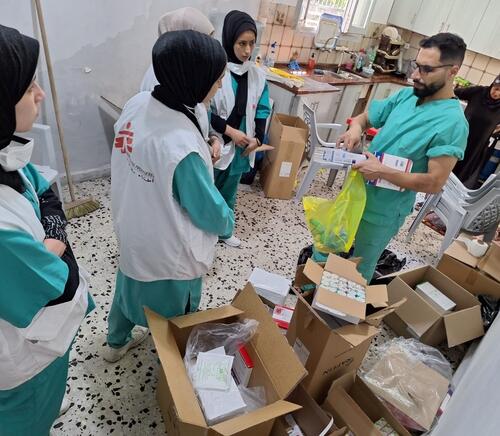
Let's take a look at how the process of getting aid into Gaza actually works. On arrival to Egypt's Al-Arish airport, humanitarian supplies are loaded on to trucks and taken to Egyptian Red Crescent warehouses, where they are inspected by Egyptian authorities. After inspection, they are reloaded on to trucks and driven to the Rafah border crossing. This first stage takes five to 10 days.
At Rafah, all trucks are scanned, then driven to an Israeli checkpoint some 50 kilometres south at Nitzana, where the supplies are unpacked, loaded on to special pallets to fit into the scanner, and scanned again. The convoy then returns to Rafah, where supplies approved by Israeli authorities are unloaded from Egyptian trucks on to Palestinian trucks to enter Gaza. This stage can take weeks.
It takes four to five weeks, on average, from the moment a shipment arrives on Egyptian territory to the moment it enters Gaza. If a single item in a shipment is rejected at Nitzana, the entire shipment is rejected and returned to Rafah, where the lengthy process begins again.
The people of Gaza are paying the price – not only the tens of thousands already injured in the war, but also all those with other medical needs.Mari Carmen Viñoles, MSF's head of emergency
In early November 2023, we made a request to Israel to bring fridges and freezers into Gaza. These are essential for storing medicines and vaccines, which require low temperatures, such as insulin for diabetes, oxytocin to reduce post-partum haemorrhaging, and suxamethonium, used in anaesthesia to induce muscle paralysis. It was not until April – five months later – that the request was approved. If all goes well, the fridges and freezers will arrive in Gaza this month.
These are not the only essential items in the queue. We are still waiting for approval to bring in generators, oxygen cylinders, ultrasound scanners, external defibrillators, intravenous sodium chloride solutions, essential for rehydrating patients and diluting drugs... The list is as long as it is alarming.
We have had no response from Israel to a request made months ago for the shipment of essential solar-powered equipment, including electrical systems for medical facilities, water pumps and water desalination systems. Satellite telecommunications systems and MSF vehicles – vital for keeping our teams safe and enabling them to get to where they are needed – have also been refused, restricted or seriously delayed.
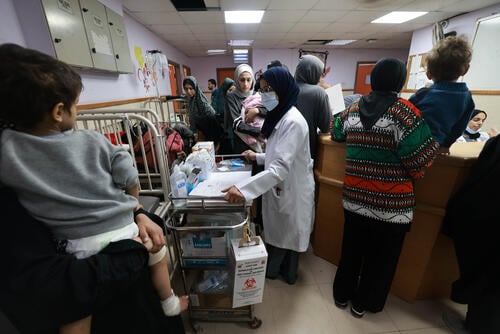
The Israeli authorities claimed on X (formerly known as Twitter) on 3 March: “There is no limit to the amount of humanitarian aid that can enter the Gaza Strip.” This statement clashes absurdly with the reality.
On 26 January, and again on 28 March, the International Court of Justice called on Israel to take “all necessary and effective measures” to ensure the unimpeded provision of “urgently needed basic services and humanitarian aid, such as water, electricity, fuel and medical supplies.”
There is no clarity or consistency to what is allowed into Gaza. Sometimes aid organisations can bring in certain items, sometimes not. Sometimes an entire shipment is rejected because of one item, but the reasons are not communicated to us, making it impossible to adapt future shipments accordingly.
So far, we have managed to bring six 120-cubic-metre shipments of essential supplies into Gaza, transported in 53 trucks. We would like to bring in much more, but have been prevented by the labyrinthine process imposed by the Israeli authorities.
Without access to medical care, thousands of lives have been lost – and will continue to be lost. These are Gaza’s 'silent killings', the result of deliberate deprivation.Mari Carmen Viñoles, MSF's head of emergency
Before the current war, an estimated 500 truckloads of supplies entered Gaza every day; by February 2024, this had reportedly dropped to below 100 truckloads per day.
The desperate shortages of essentials across Gaza are compounded by the fact that just two border crossings are open: Rafah and Kerem Shalom, both in south Gaza. Few trucks entering the south are able to pass through the numerous checkpoints further north, due to insecurity or a lack of authorisation from Israeli authorities.
As a result, very little aid and few basic supplies are reaching north Gaza. With no access to the area, we can only guess at the humanitarian crisis unfolding there. Air drops and sea corridors, though widely publicised, have so far been few and far between and are no substitute for land routes.
Blocking aid from reaching Gaza is destroying its health system, which cannot meet people’s needs. The people of Gaza are paying the price – not only the tens of thousands already injured in the war, but also all those with other medical needs: people with chronic illnesses, pregnant women with complications, children falling sick from infectious diseases linked to the deplorable conditions in which they are forced to live.
Without access to medical care, thousands of lives have been lost – and will continue to be lost. These are Gaza’s 'silent killings', the result of deliberate deprivation.



